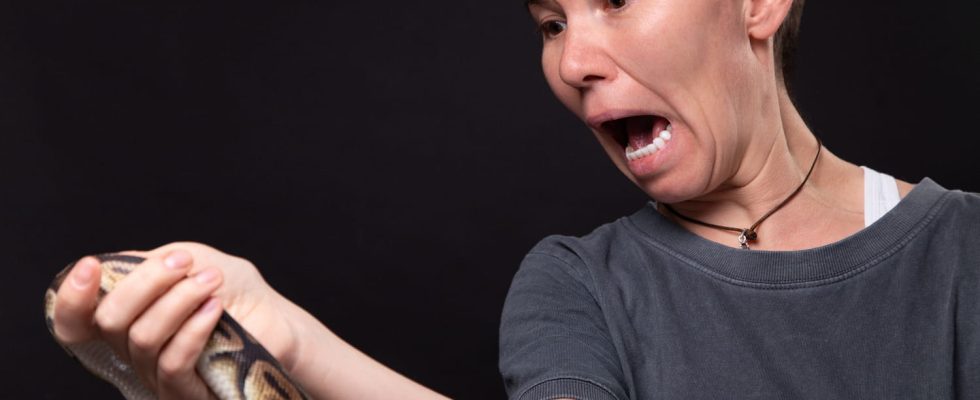Does the sight of a snake make you dizzy? Like many people, you may have ophiophobia. How does this fear manifest itself and how do you deal with it?
What is the name of the fear of snakes?
It is necessary to distinguish the fear of snakes from the phobia of snakes. For Valerie Sengler the fear of snakes is natural and innate. “Men who lived in nature in prehistoric times, for example, were already afraid of snakes since they could die if they were bitten. This fear is normal. It protects us from danger. Some studies even show that the Humans have an instinctive fear of snakes acquired through group experience and transmitted to ensure the survival of the species.“, details the psychoanalyst. Ophiophobia, whose etymology comes from the ancient Greek words ”ophis” (snake) and ”phobia” (fear), means snake phobia. “It’s about a excessive and abnormal fear of the snake. This results in the impossibility of being in the presence of the animal or even of seeing an image representing it.“, she explains.
Meaning: why are we afraid of snakes?
Fear of the serpent would be engendered by the physiognomy of the animal. “He has a special look. It is a long, cold-blooded animal with a forked tongue. It crawls, climbs trees and moves without being heard coming, which brings a feeling of fear. In some countries, people are even particularly careful, because they can hide in houses“, says the specialist.
In women, this phobia would be linked “to the fear of our female sexuality”
In the West, this fear also has its roots in the Judeo-Christian religion. “In the Bible, there is a whole imagery around the snake. It refers to the devil. It is the one who made Eve fall into sin. mistake“, continues Valérie Sengler before adding”Fear is something innate, built and acquired in society. If we had been made such a scheme for cats, it could be the same with them“. Phobia is pathological. “It will serve as an anchor point for something that we have experienced and which we do not remember. This anchor point allows us to live normally – and will prevent our world from collapsing – since the object of our trauma is crystallized in the phobia of the snake. It doesn’t have to be animal related.“, advances the psychoanalyst. In women, this phobia would be linked “to the fear of our female sexuality“.”For Jung, this fear is linked to the fear of the penis, because the serpent is symbolic of the phallus. Rather, I think it may be women who have been traumatized about their sexuality. They may have been abused, small and may be unable to have a fulfilling sex life. They can have sex with men, but instead of having a phobia of the penis, they will have a phobia of the snake“, observes Valérie Sengler. Finally, a bad experience can also be the cause of a phobia of snakes. The psychologist evokes the case of a patient suffering from ophiophobia. “When we looked at the transgenerational level, we realized that her great-grandmother who lived in the countryside had found a viper in her bed at bedtime. It was a total drama and she was so shocked that it came to light. All the women in the family have been snake phobic, because there is a traumatic story around this animal. It is not the snake in itself, but the insane anguish that this woman experienced and which was received by her children, who were also overwhelmed by this horror. What we transmit are the emotions“.
What are the symptoms of fear of snakes?
The fear of snakes makes us cautious. “We are more careful than others, for example when traveling. We may avoid going to places where there are snakes. There is a markup so as not to encounter any“, explains the psychoanalyst. The phobia generates, for its part, severe physical and bodily reactions that are difficult to control like the feeling of suffocation, abdominal pain, hot flashes or chills. “If they are brought into contact with a snake, there may be decompensation“, observes Valérie Sengler before continuing. “They may be shaken, paralyzed or faint. If the phobia hides something very traumatic and the person does not come to their senses, as with all phobias, the person may have to be interned, because the shock is too violent“.
Various solutions are currently proposed such as the cognitive behavioral therapy (CBT) or hypnosis. “For phobias, I think you have to be careful with hypnosis, because you never know what they hide. I notice, for example, that the phobia often comes back. Through the phobia, the unconscious says something. So we’re not going to put a band-aid over his mouth“, warns the specialist. In her practice, she prefers EMDR and transgenerational psychoanalysis. “I start from the body, asking where the phobia is located. According to what is said, I will go on a psychoanalytic and transgenerational analysis. We often realize that there are traumatic things related to abuse or rapes transgenerational. When the origin of this disorder is lifted, the person heals”.
Thanks to Valérie Sengler, transgenerational psychoanalyst and author of the book La psy qui curit.
